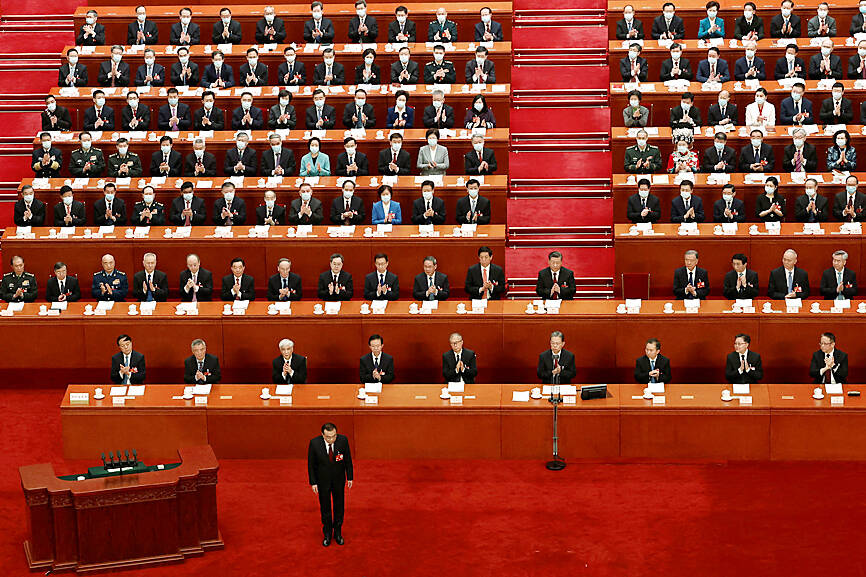China’s goal of promoting economic and cultural exchanges with Taiwan this year does not mean Beijing has ruled out tougher measures against Taipei, an academic said yesterday.
Kou Chien-wen (寇健文), director of National Chengchi University’s Institute of International Relations, made the remark at an institute forum to discuss the Chinese National People’s Congress, which started on Sunday, and the Chinese People’s Political Consultative Conference, which started on Friday.
A key topic was a proposed plan to reform the Chinese Communist Party (CCP) and state institutions, which had been discussed at a CCP Central Committee meeting last month, Kou said.

Photo: Reuters
Although a detailed plan has not been published, the proposal would concentrate the president’s authority and expand the power of CCP committees, he said.
During the Chinese National People’s Congress, outgoing Chinese Premier Li Keqiang (李克強) said the CCP is pursuing a cross-strait policy that underlines peaceful development and cultural exchanges.
Beijing this year plans to promote peaceful unification with Taiwan through exchanges, but “it doesn’t mean that it would abstain from taking harder measures,” Kou said.
China might employ a carrot-and-stick approach to Taiwan this year, but it would be challenging, as measures such as military harassment of Taiwan might interfere with softer measures such as cultural exchanges, he said.
Chinese academics are worried that exchanges with Taiwanese counterparts might bring them trouble amid Beijing’s increasing control of society, he said, adding that the CCP should ensure that such exchanges would be free of interference.
Wang Hsin-hsien (王信賢), the institute’s deputy director, told the forum that Beijing is unlikely to abandon its “one country, two systems” approach, but it might adjust it after Wang Huning (王滬寧) becomes chairman of the Chinese People’s Political Consultative Conference.
As indicated in the proposal of a version of the “one country, two systems” framework for Taiwan, China might seek to emphasize the similarities between China and Taiwan, such as shared culture and ethnicity, rather than their differences, he said.
The CCP has not held a working meeting this year to discuss its Taiwan policy, which is usually in February or March, which might be due to recent appointments at China’s Taiwan Affairs Office, he said.
Veteran Chinese diplomat Song Tao (宋濤) replaced Liu Jieyi (劉結一) as head of the office at the end of last year, which cross-strait relations experts said was an indication that Beijing is giving Taiwan affairs higher priority.
It remains to be seen whether the “reform plan for the state institutions” would include Taiwan-related agencies, which can lead to a delay in the working meeting, Wang Hsin-hsien said.

The brilliant blue waters, thick foliage and bucolic atmosphere on this seemingly idyllic archipelago deep in the Pacific Ocean belie the key role it now plays in a titanic geopolitical struggle. Palau is again on the front line as China, and the US and its allies prepare their forces in an intensifying contest for control over the Asia-Pacific region. The democratic nation of just 17,000 people hosts US-controlled airstrips and soon-to-be-completed radar installations that the US military describes as “critical” to monitoring vast swathes of water and airspace. It is also a key piece of the second island chain, a string of

A magnitude 5.9 earthquake that struck about 33km off the coast of Hualien City was the "main shock" in a series of quakes in the area, with aftershocks expected over the next three days, the Central Weather Administration (CWA) said yesterday. Prior to the magnitude 5.9 quake shaking most of Taiwan at 6:53pm yesterday, six other earthquakes stronger than a magnitude of 4, starting with a magnitude 5.5 quake at 6:09pm, occurred in the area. CWA Seismological Center Director Wu Chien-fu (吳健富) confirmed that the quakes were all part of the same series and that the magnitude 5.5 temblor was

Taiwan will now have four additional national holidays after the Legislative Yuan passed an amendment today, which also made Labor Day a national holiday for all sectors. The Chinese Nationalist Party (KMT) and Taiwan People’s Party (TPP) used their majority in the Legislative Yuan to pass the amendment to the Act on Implementing Memorial Days and State Holidays (紀念日及節日實施辦法), which the parties jointly proposed, in its third and final reading today. The legislature passed the bill to amend the act, which is currently enforced administratively, raising it to the legal level. The new legislation recognizes Confucius’ birthday on Sept. 28, the

The Central Weather Administration has issued a heat alert for southeastern Taiwan, warning of temperatures as high as 36°C today, while alerting some coastal areas of strong winds later in the day. Kaohsiung’s Neimen District (內門) and Pingtung County’s Neipu Township (內埔) are under an orange heat alert, which warns of temperatures as high as 36°C for three consecutive days, the CWA said, citing southwest winds. The heat would also extend to Tainan’s Nansi (楠西) and Yujing (玉井) districts, as well as Pingtung’s Gaoshu (高樹), Yanpu (鹽埔) and Majia (瑪家) townships, it said, forecasting highs of up to 36°C in those areas